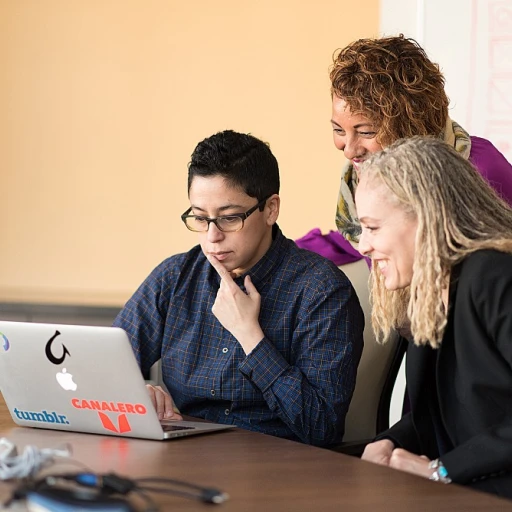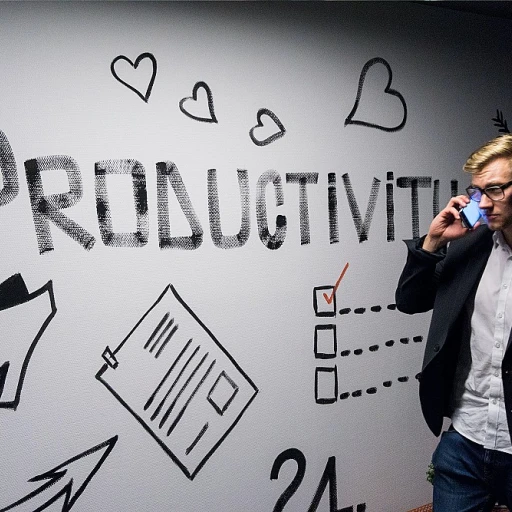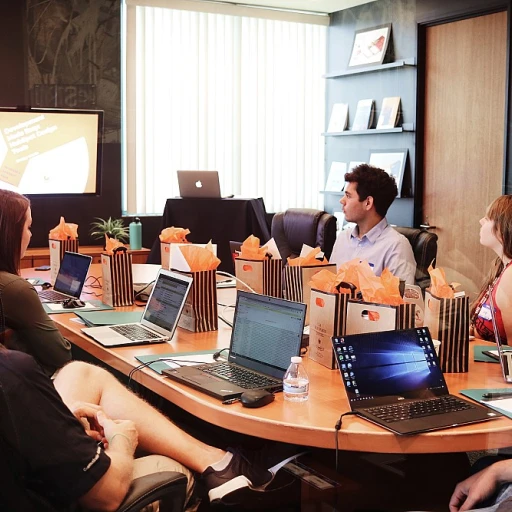Understanding the Mentor Matching Engine
Exploring the Fundamentals of Mentor Matching Engines
A mentor matching engine serves as the backbone of modern mentoring programs, seamlessly pairing mentors and mentees based on a variety of criteria. But understanding how this sophisticated software operates is vital for anyone looking to harness its full potential.
In simple terms, a mentor matching engine is a technology-driven tool that facilitates the mentor-mentee pairing process. By collecting data on individuals' professional goals, skills, and other attributes, the engine works to create optimal matches that can foster effective mentoring relationships. It's akin to the intricate algorithm workings found in
mentor-mentee trust building, which emphasize the need for compatibility and understanding.
These matching engines aren't just for professional environments. They prove invaluable across diverse fields including education sectors like high schools, where they can be applied to connect students with industry professionals in fields such as science technology and others.
While the mentor matching process sounds straightforward, the alignment of mentors and mentees is a nuanced task. The engine must account for individual aspirations and career paths, which can be as diverse as the participants themselves. This complexity underscores the necessity for integrating both technology and human judgment to achieve the best results in mentoring programs.
By automating the mentor match process, organizations can streamline their mentoring programs, save time, and ensure a well-structured mentorship experience for all participants. The successful implementation of such mentoring software often requires keen insight into its features and limitations, ensuring that the engine not only aligns with company goals but genuinely supports the professional growth of its users.
The Benefits of an Effective Mentor Match
Why Efficient Mentor Matches Matter
In any successful mentorship program, the importance of an effective mentor match cannot be overstated. The matching process is the engine that drives the relationship between mentors and mentees, ensuring that both parties can work toward their professional goals effectively. Whether it's connecting experienced professionals with students eager to learn or pairing seasoned industry veterans with employees looking to advance their careers, finding the right fit is crucial for fostering a productive mentorship relationship.
An adept match can bring about remarkable benefits, helping to bridge the gap between theoretical learning and practical application. Mentors offer invaluable guidance, while mentees bring fresh perspectives and enthusiasm to the table. The right pairing can create a symbiotic relationship where both parties gain unique insights, thus enhancing their respective professional journeys.
Moreover, the seamless integration of mentor matching software within programs can streamline the matching process, reducing the time and effort required to find ideal matches. This mentoring software often leverages algorithms to consider multiple factors such as career goals, industry expertise, and personal interests to deliver perfect mentor-mentee pairings. This use of technology is not solely restricted to science and technology fields but extends across various domains, including high school mentorship programs and initiatives in places like the state of Illinois.
Through the lens of personalized
navigating the path to finding a mentor in your field, potential mentors and mentees can pinpoint exactly what they are looking to achieve in a mentorship program. This clarity aids in aligning the expectations and aspirations of both parties, making the mentorship programs more effective and meaningful.
In conclusion, efficient mentor matching is a cornerstone of successful mentoring programs. It catalyzes opportunities for personal and professional growth, for mentors and mentees alike, creating lasting impacts on their careers.
Challenges in Mentor-Mentee Pairing
Navigating the Complexities of Mentor-Mentee Pairing
The journey of aligning mentors and mentees is not without its hurdles. As we delve into the intricacies of mentor matching, it becomes evident that several challenges need addressing to facilitate effective mentorship programs. The advancing functionality of a mentor matching engine can be a game-changer, but understanding these challenges is crucial.
Firstly, the diversity of program goals plays a pivotal role in the matching process. What constitutes a successful professional mentoring relationship varies across different contexts. High school students might seek guidance on choosing a career path, whereas employees in a corporate setting might focus on progressing within a company. Identifying the specific needs and career goals of mentees is essential for creating successful matches.
The human element presents another layer of complexity. Each mentor and mentee brings unique personal and professional backgrounds to the program. Matching engines, while highly efficient, must incorporate a personal touch to account for these nuances. This includes considering personality traits and communication styles to foster compatibility and trust between mentors and mentees.
Additionally, mentors themselves face challenges. Finding a balance between providing guidance and allowing mentees the space to grow can be difficult. Understanding reasonable suspicion training in professional mentoring can help mentors refine their approach, as explained in this
helpful resource.
The incorporation of personalization within matching software is crucial. By integrating data-driven insights and algorithms, programs can enhance mentor-mentee pairing without losing the human touch, setting the stage for successful, impactful mentorship relationships. Thus, overcoming these challenges requires a persistent blend of technology and empathy in the mentorship journey.
Personalization in Mentoring
Enhancing the Mentoring Experience through Personalization
Personalization plays a critical role in the success of any mentoring program. A mentor matching engine that leverages personalization ensures that the unique needs of mentees and mentors are met more effectively. This increases the overall satisfaction and success rates within mentoring programs.
Understanding the personal and professional backgrounds of both mentors and mentees is essential in creating effective mentor matches. The matching process relies on the collection and analysis of data such as career goals, areas of expertise, and personal interests. This information helps in aligning the aspirations of mentees with the guidance mentors can provide.
To enhance personalization in mentor matching:
- Utilize Advanced Data Collection: Comprehensive profiles of mentors and mentees should be built, incorporating not just professional experiences but also personal interests and values. This helps in creating meaningful mentor-mentee matches that go beyond the surface level.
- Leverage Adaptive Matching Software: The use of sophisticated matching software allows for dynamic adjustments in the matching process. As the needs of mentees evolve, the engine can reassess and recalibrate matches to suit new requirements.
- Facilitate Regular Feedback: Implement a system where both parties provide frequent feedback about their mentorship journey. This feedback loop helps in constantly refining the mentor matching process, leading to more tailored experiences.
Incorporating technology, such as AI-powered matching engines, adds a layer of precision in mentor-mentee pairings. However, it is the blend of technological efficiency with a human touch that truly fulfills the potential of mentorship programs. Understanding both the capabilities of software and the nuances of human interactions will contribute significantly to personalizing mentorship experiences.
Whether mentoring students in high school or employees seeking career advancement, the adaptation of mentor matching engines can substantially enhance the effectiveness of mentorship programs. The integration of science and technology, widely seen in states like Illinois, further drives this personalized approach, ensuring that mentorship remains relevant, impactful, and ultimately transformative for all involved.
Technology Meets Human Touch
Harmonizing Technology and Human Interactions
In today’s rapidly evolving landscape, integrating technology with human interaction is paramount in creating efficient and meaningful mentoring connections. Leveraging a mentor matching engine can enhance professional mentoring by seamlessly aligning mentors and mentees through data-driven processes. However, successful implementation requires a balance between technology’s precision and the nuanced understanding only human insight can provide.
A technologically empowered mentoring program is not just about automating the mentor-mentee matching process. It’s about enabling smarter and more efficient matches that align with the goals and aspirations of those involved. Here’s how technology can be harmoniously integrated with human touch:
- Enhanced Personalization: Matching engines use sophisticated algorithms to analyze goals, professional backgrounds, and skills. Combining this data with insights gathered from personal interactions ensures that matches are more personalized and relevant, enhancing the potential for successful mentorship.
- Streamlined Administrative Tasks: Mentoring programs, whether for high school students or employees in science and technology sectors, face substantial administrative burdens. A matching app or software can automate these tasks, freeing up human resources to focus on developing deeper mentor-mentee relationships.
- Data-Informed Decisions: Matching engines collect valuable data throughout the mentoring program lifecycle. By analyzing this information, program coordinators can make informed decisions, improve mentorship outcomes, and align programs to better meet the evolving needs of state-specific industries, such as Illinois science sectors.
- Feedback Loops: Technology facilitates effective feedback systems. Mentors and mentees can provide insights into the match quality and personal growth, allowing for continual improvement of the matching process and program goals.
Incorporating technology into mentoring initiatives doesn’t replace the crucial human element but amplifies its effectiveness. By merging state-of-the-art matching software with empathetic human guidance, programs can unlock their full potential, building robust mentorship ecosystems where both mentors and mentees thrive.
Implementing a Mentor Matching Engine
Steps to Implement a Successful Mentor Matching Engine
Creating an efficient mentor matching engine can be a game-changer for mentorship programs. When thoughtfully implemented, it can enhance the mentor-mentee matching process, ultimately resulting in productive, goal-oriented mentoring relationships that benefit both parties—mentors and mentees alike.
Define Clear Objectives and Goals
Before delving into the technology, it’s essential to outline the objectives and goals specific to your mentoring program. Whether the focus is professional development for employees, support for high school students, or guidance in science technology fields, having a clear vision assists in shaping the software to address these needs effectively.
Select Appropriate Technology Tools
Choosing the right software that aligns with your program’s goals is crucial. Consider whether a matching app, software, or other digital tools will best serve the needs of your mentors and mentees. The chosen technology should provide a user-friendly experience that emphasizes ease of use for all participants in the matching process.
Focus on Personalization
Integrating personalization into the mentor matching process elevates the quality of the matches. Leverage data to pair mentors and mentees based on shared goals, career paths, and interests to foster stronger connections and better outcomes. Personalized matches are more likely to lead to long-term productive mentorships.
Ensure Continuous Feedback and Adaptability
The successful implementation of a mentor matching engine depends on continuous feedback from both mentors and mentees. Encourage open communication about their experience and gather insights into the effectiveness of the matches. This feedback loop allows for constant refinement of the matching engine, making it more adaptable to changing needs.
Regular Evaluation and Adjustments
Regularly evaluating the program’s impact and the satisfaction levels of participants can reveal areas of improvement. Use this data to adjust the engine’s algorithms and personalize recommendations further, ensuring that the matches remain relevant and valuable.
By carefully implementing a mentor matching engine, mentoring programs can enhance their matching process, providing tangible benefits for mentors, mentees, and the institutions supporting them in places like the state of Illinois. As this collaborative framework continues to evolve, it’s imperative to keep melding technological advancements with the innate human touch that makes mentorship a uniquely powerful professional tool.














